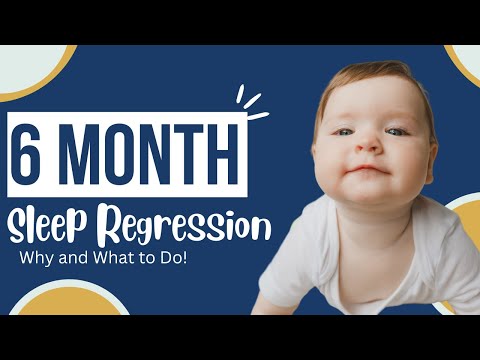The 6 month sleep regression can feel like a storm tearing through your home. You’ve finally settled into a routine, and then, BOOM! Your baby suddenly wakes more often, and naps become a distant memory. This phase is a challenge many parents face, but understanding the 6 month sleep regression can be your best ally in overcoming this sleep crisis. Let’s break it down.

Understanding the 6 Month Sleep Regression
At six months, your baby is no longer that helpless little bundle — they’re developing rapid cognitive and motor skills. This growth comes with its own set of challenges, causing significant sleep disruptions. Imagine trying to focus in a crowded gym while your favorite workout playlist blares loud and distracting. That’s how your baby feels when they’re trying to sleep during this stage.
Increased wakefulness, short naps, and trouble falling asleep can create chaos for both you and your little one. It’s essential to grasp the root causes of the 6 month sleep regression to find effective strategies to combat these nighttime battles. The emotional and developmental milestones hit hard during these months, and knowing what’s going on helps parents feel more equipped for the challenge.
Is your baby fussy? Getting your little one to sleep might feel like trying to lift weights without knowing the right form. The good news is that you’re not alone in this. Plenty of parents are in the same boat, asking themselves why their baby won’t settle. Understand that it’s just a phase.

Signs of the 6 Month Sleep Regression and Its Connection to the 4 Month Sleep Regression
The 6 month sleep regression often mirrors the struggles faced during the 4 month sleep regression. Both periods are characterized by developmental leaps that shake up previously established sleep routines. You could say it’s like moving from one intense training cycle to another — challenging but necessary for growth.
During the 4 month sleep regression, babies transition from deep sleep to a more active sleep cycle. This means frequent waking and possible confusion for your little one as they try to navigate this new landscape. Fast forward two months, and as babies reach the six-month mark, they start recognizing their surroundings, experiencing separation anxiety, and feeling more aware than ever.
Common Signs of the 6 Month Sleep Regression
Parents often notice their little ones reacting differently depending on their surroundings. The ability to be alert increases, so stimulating environments might keep them awake longer, which can give you a taste of frustration.

Tips for Overcoming the 6 Month Sleep Regression
Now that you’ve identified the signs, let’s tackle the problem head-on! Here are five foolproof strategies to conquer the 6 month sleep regression:
A solid bedtime routine is your best friend. Think of it as the warm-up before a big lift. Brands like Baby Merlin’s Magic Sleep Suit suggest rituals could include a warm bath, storytime, and dimming the lights. Make it all about signaling bedtime to your baby to ease them into sleep.
Transitional objects (like a beloved stuffed animal or blanket) can soothe your baby during this rough patch. Studies show that these items provide a comforting link to parents, helping babies self-soothe during those pesky nighttime awakenings.
Your baby’s napping schedule may need tweaking. Keeping track of their sleep patterns with handy apps like Baby Tracker can pinpoint when naps are best. Sometimes, it’s all about finding that sweet spot to promote longer stretches of nighttime sleep.
Avoid creating habits tied to sleep that your baby might rely on! If baby can only sleep when rocked or nursed, that might lead to troubles returning to dreamland by themselves.
If sleepless nights become common, seek advice from pediatric sleep consultants. Dr. Harvey Karp, known for “The Happiest Baby on the Block,” can offer insights to break persistent patterns and find ways to ease sleep struggles.

Adopting the 15 Day Cleanse for Sleep Improvement
Consider an innovative approach known as the 15 Day Cleanse for Sleep. This plan serves as a reset for both you and your baby, allowing you to fine-tune bedtime habits. By temporarily rebooting your sleep routine, new results might emerge in little time.
By the end of this two-week cleanse, parents often see noticeable improvements. Babies might settle faster, sleep longer, and emerge more refreshed.

Embracing Change and Fostering Resilience
The 6 month sleep regression might feel intense, but it’s also a chance for growth — not just for your child, but for you as a parent. Embrace this change as an opportunity to cultivate resilience in both of you. Stick to routine, offer comfort, and acknowledge the developmental changes your baby is facing.
Navigating this challenging period is all about patience and creativity. Don’t hesitate to connect with other parents or join online communities for tips and support. Armed with the right tools and support, you’ll guide your little one and yourself through this phase, emerging stronger on the other side.
As you and your baby wade through the ups and downs, remember that you’re building a future where stellar sleep is possible. Let’s face it; resilience is built over time, like a well-crafted muscle! By tackling the 6 month sleep regression with these strategies, you’ll foster better sleep habits and equip yourself with skills for whatever parenting challenges lie ahead.
With dedication and a little help, you’ll both come out on top! Don’t forget the simple joys of this experience, like those sleepy baby smiles right after a great nap or the growth milestones coming alongside these challenges. Keep pushing through, and before you know it, you’ll find a rhythm that works.
And if you’re ever looking for a way to boost your energy through this sleepy season, check out those Vitamins For energy that might help you keep up with baby!
Now, let’s get to work, one night at a time!
6 Month Sleep Regression: Fun Facts and Trivia
Understanding the 6 Month Sleep Regression
Ah, the famous 6 month sleep regression! This milestone in a baby’s development can leave many parents scratching their heads, feeling like they’ve hit a sleep crisis. Did you know that this period usually occurs as babies start to become more aware of their surroundings? Their newfound alertness can lead to longer wake times, making it tricky for them to settle down. In fact, a study found that many infants exhibit increased social skills during this time, which is probably why they’re so distracted at bedtime. Just like how homeowners consider lien holder meaning, parents need to understand that this phase, while frustrating, is a natural part of growing up.
Tips to Cope with the Troublesome Toll
So, what can you do to ease the 6 month sleep regression blues? One effective method is to establish a comforting bedtime routine, which helps signal to your little one that it’s time to wind down. Keep in mind that sleep training is not a one-size-fits-all solution. Just like tailoring a garment, you will need to find what suits your baby best. If you’re closely monitoring food Recalls This week, you might want to look for any irritants that could affect your baby’s sleep quality, as a calm tummy leads to a tranquil night.
Making Sense of the Madness
When you’re bleary-eyed and trying to make sense of your baby’s erratic sleep patterns, finding support is crucial. Research has shown that certain sleep aids can actually worsen the problem—this is why it’s good to explore stevia side effects, too, since you’ll want to avoid any additives in foods that might rev up your baby’s wakefulness. According to parents who’ve encountered the 6 month sleep regression, patience is vital; after all, just like hitting a jackpot at Little Creek Casino, it’ll eventually pay off!
Feeling a bit overwhelmed? Don’t worry! Just remember that this phase is temporary. Babies often experience various developmental milestones, akin to the love Bites shared between partners—intense yet fleeting. Those moments will pass, and soon enough, you’ll find your little one sleeping soundly again, ready to take on the new challenges of their next growth spurt. For now, hang in there, and don’t hesitate to turn to resources like Rachel Hurd-wood for expert advice on parenting during these testing times.



























